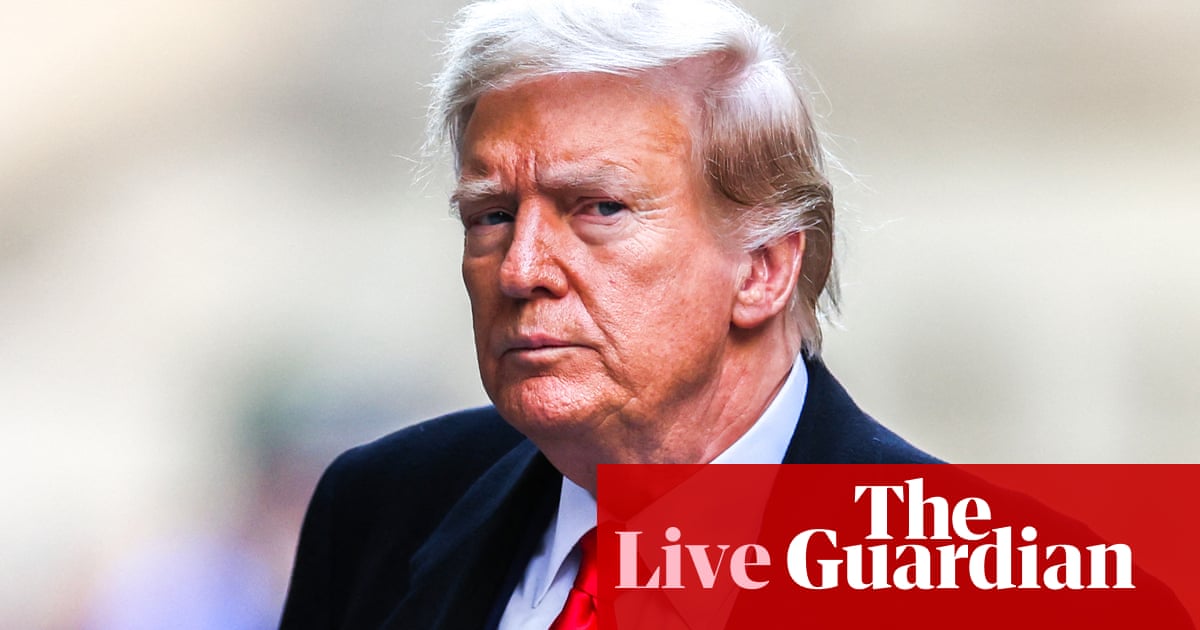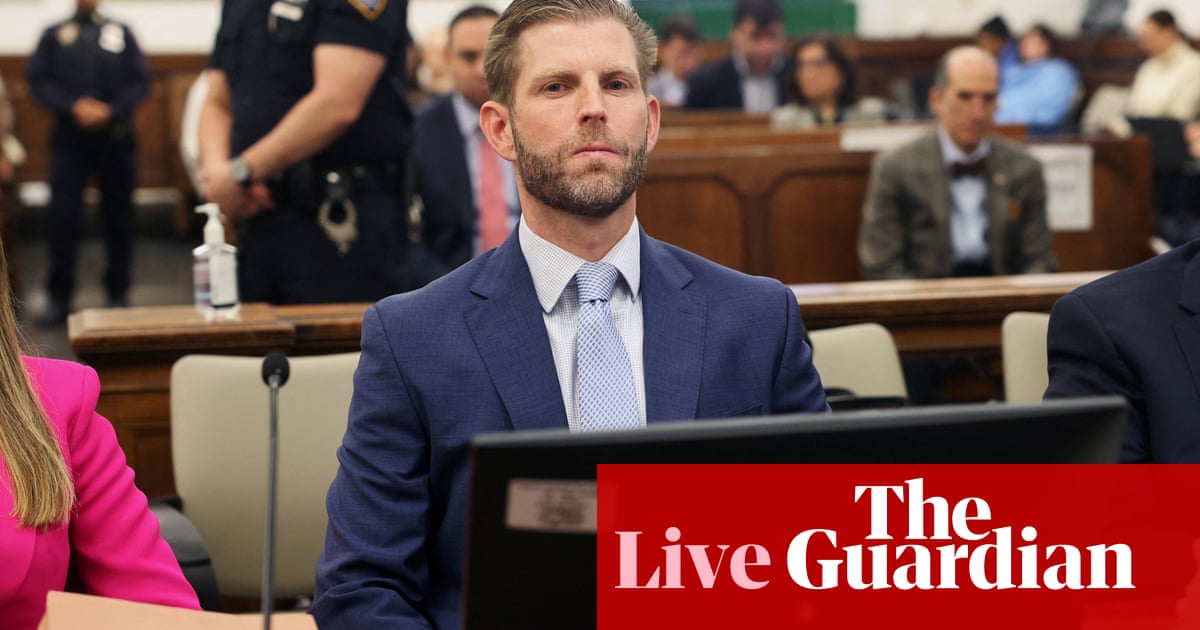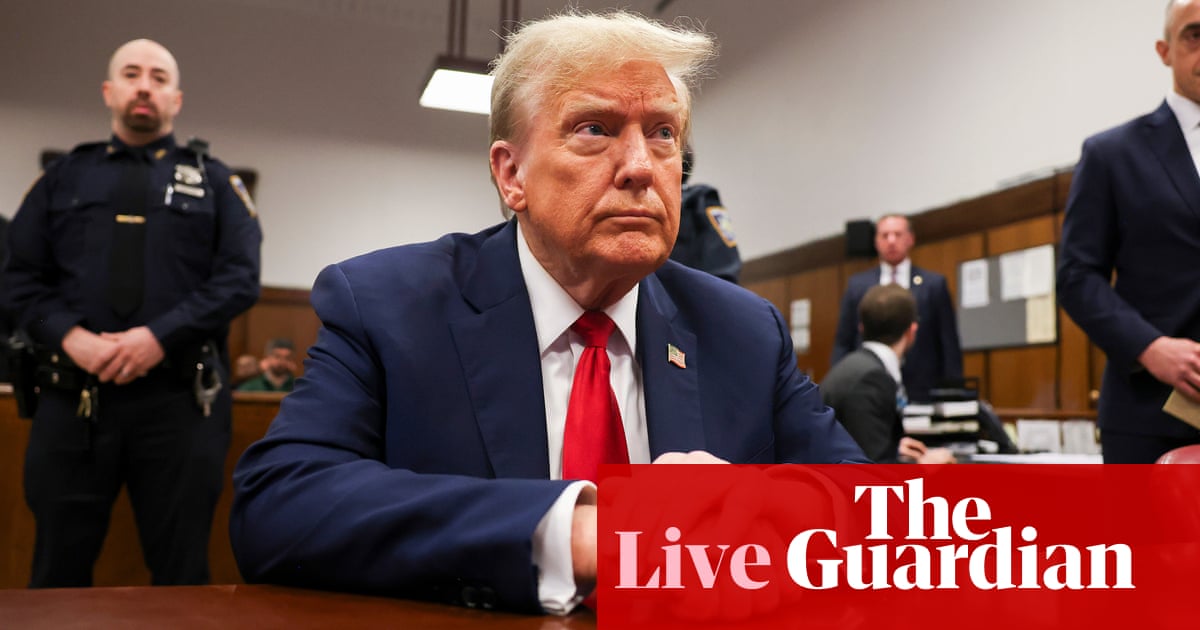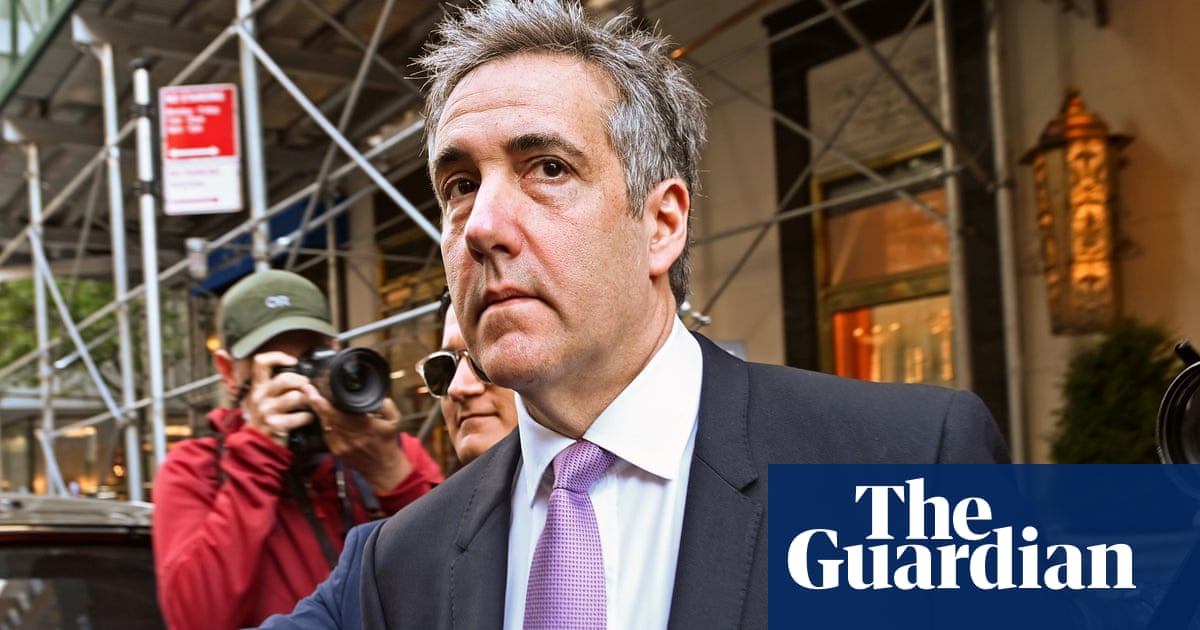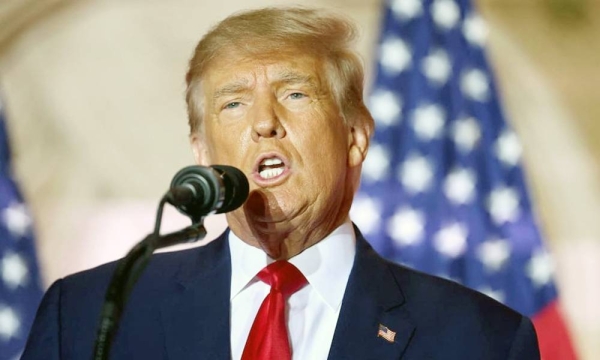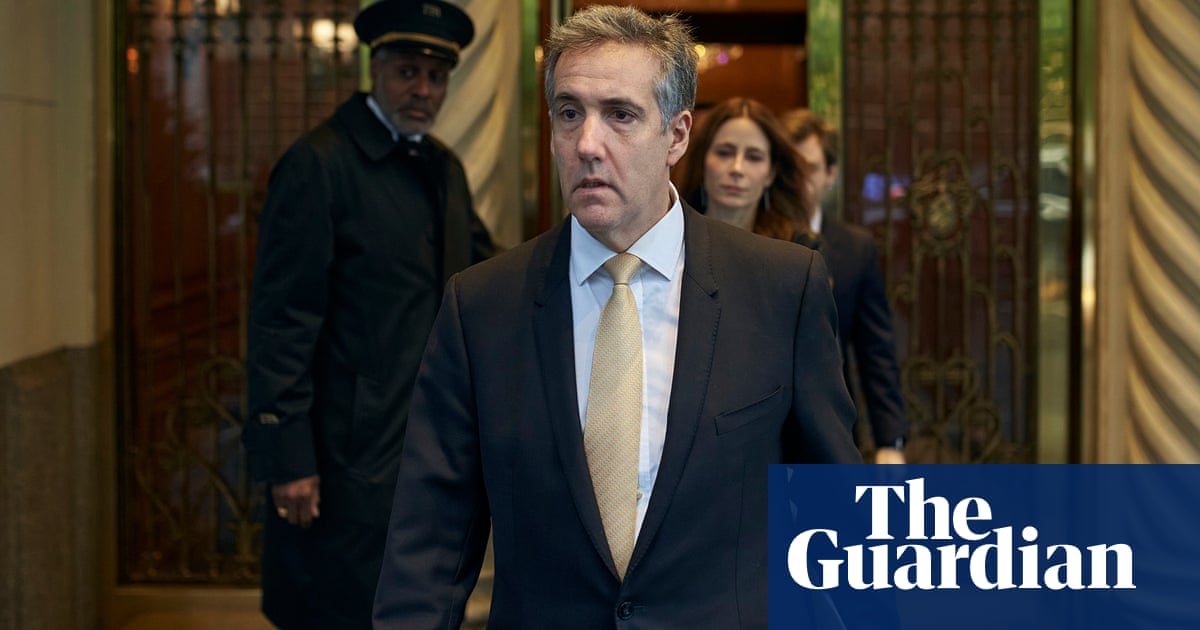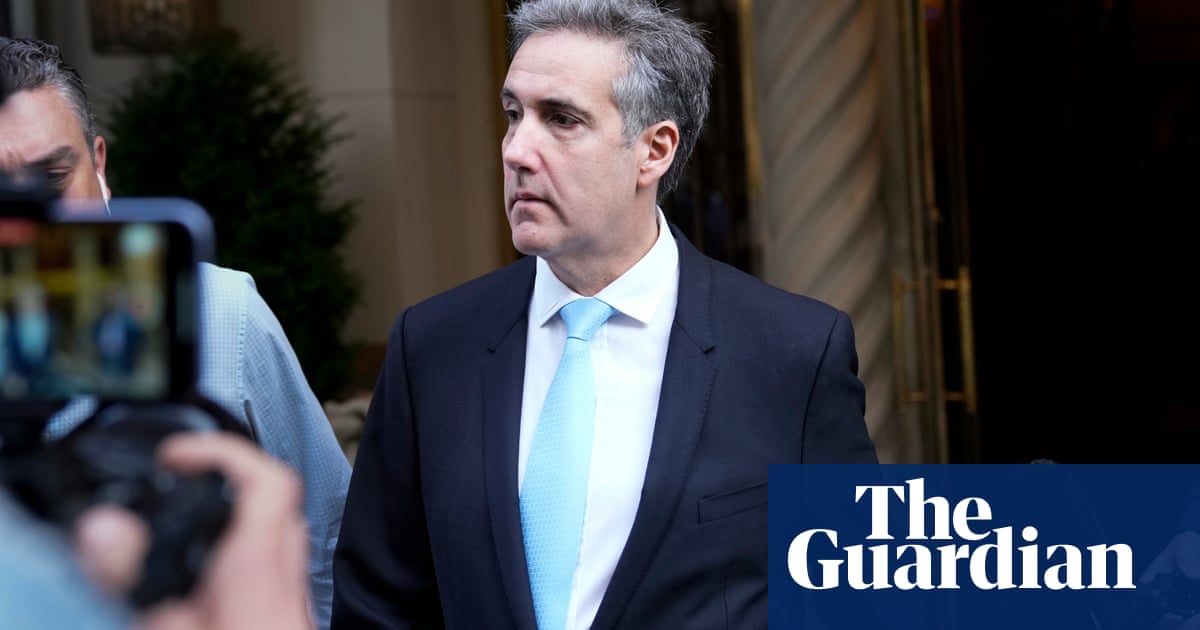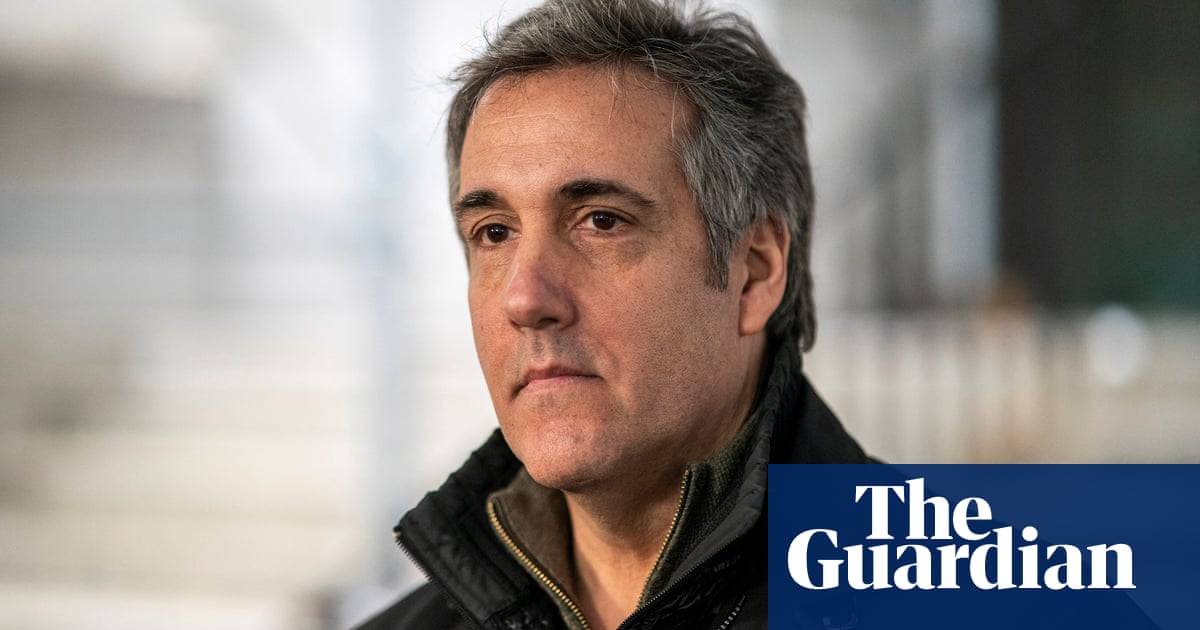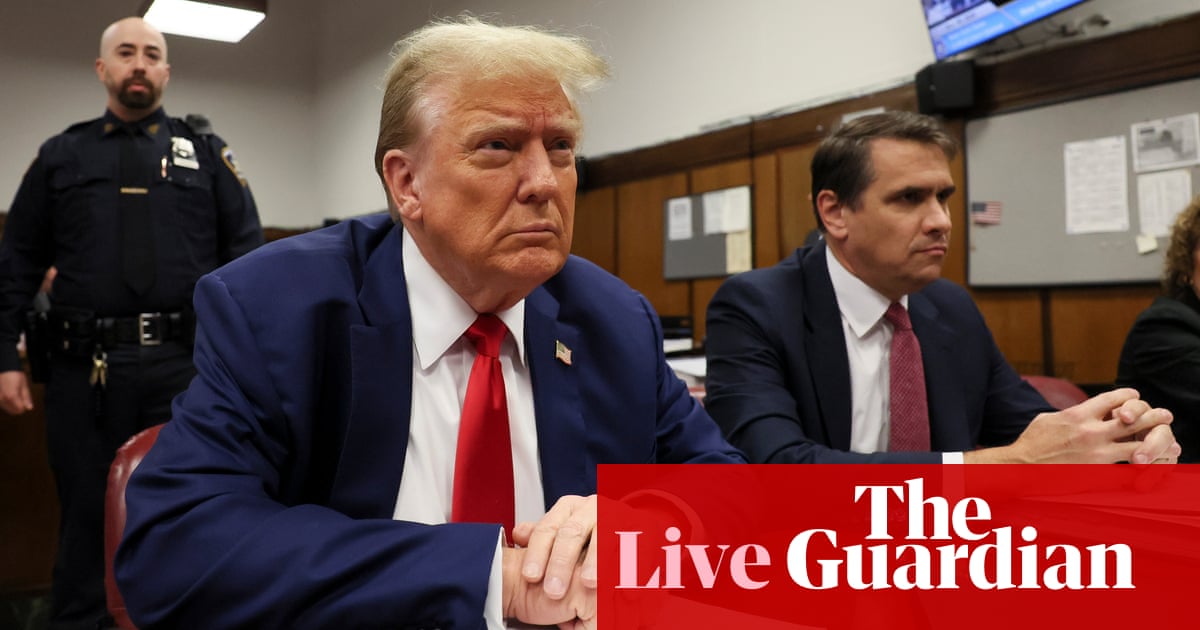
Accountant says Trump "personally signed" checks to Cohen
The prosecution has asked the former Trump Organization accountant Deborah Tarasoff about various business documents showing payments to Michael Cohen, including voided checks from the Donald J Trump Revocable Trust.
Several voided check copies were shown in court, including the $70,000 one we’ve already mentioned that was signed by the ex-Trump Organization chief financial officer Allen Weisselberg and Eric Trump, one of Trump’s adult sons, to bolster the notion that the ex-president was very connected to repayments to Cohen.
Cohen is Trump’s “fixer” who made the hush money payment to adult movie star Stormy Daniels that is at the heart of this case.
In 2017, payments to Cohen switched from the trust, Tarasoff said. In response to questions about documents, she pointed out that around spring that year, payments to Cohen were coming from Trump personally, not from his trust.
She confirmed that Cohen was paid $35,000 for a month’s invoice from the personal account, which matched the trust-based payment. She was then shown a voided check for $35,000 from June 2017.
“Who’s signature is that?” she was asked. “Mr Trump’s”, she replied.
She was also shown a check from July 2017 signed by Trump as well. The whole point of showing that Trump himself signed checks is again to chip away at any claim that he was detached from these transactions. He is literally paying back Cohen with his own money.
Closing summary
It’s been a lively day in New York, where former president Donald Trump is on trial for criminally falsifying and hiding a hush money payment to an adult film star. On his way out of the courtroom just now, Trump complained to reporters that prosecutors said their case could take at least another two weeks to present.
Repeating previous false claims, he insisted the trial was merely a ruse to keep the Republican party’s presumptive presidential nominee “off the campaign trail”.
“I thought they would be finished today,” Trump said. “The judge is so happy about two or three more weeks because they all want to keep me off the campaign trail. That’s all this is about, election interference”.
Judge Juan Merchan has been a frequent target of Trump’s ire through the three weeks of the trial so far.
We’ll be back again tomorrow to cover more developments in Trump’s hush money trial. Here’s a look at today’s highlights from the courtroom:
Deborah Tarasoff, a former accountant at the Trump Organization, testified that Trump personally signed reimbursement checks to his “fixer” Michael Cohen, who made the payment to adult movie star Stormy Daniels that’s at the heart of this case. Showing that Trump signed them chips away at the defense claim Trump was detached from the transactions.
Tarasoff was led through a succession of checks to Cohen that she cut, then sent to Trump for signing, some while the former president was in the White House. The purpose appeared to be giving the jury a clear understanding of the regular practices in place at the company and how the hush money payment to Daniels veered outside normal procedures to point of illegality.
This morning, Jeffrey McConney, the Trump Organization’s retired controller and senior vice-president, took the stand. Prosecutor Matthew Colangelo pressed him hard on the company’s accounting and reporting procedures, seeming to make headway on the argument that Trump was in full control of his personal and company finances, and had authorized and was aware of the purpose of the payment to Daniels.
But Trump’s lawyer Emil Bove got McConney to concede he had never spoken with Trump about repayments to Cohen, and had never been directed to register the payments in a certain way, or improperly.
Bove suggested there was no falsification, in part because of the narrow way Trump Organization payments had to be recorded using the drop-down menu of an “antiquated” software recording system.
Additionally, McConney conceded, Cohen was Trump’s personal lawyer, and that he always recorded payments to lawyers as “legal expenses” in the ledger during his 36-plus years with the company.
Judge Juan Merchan found Trump in contempt for breaching a gag order by speaking about the jury, namely how quickly it was seated, and his belief it was made up of “95% Democrats”. Merchan fined Trump $1,000, bringing the total fines to $10,000 for 10 separate breaches, and warned Trump he faced jail for any subsequent infraction.
Trump prosecution case to run "another two weeks"
Donald Trump’s New York hush-money trial is in recess until Tuesday morning, after questioning of the day’s final witness, former Trump Organization accountant Deb Tarasoff, concluded without a redirect.
Judge Juan Merchan told jurors that testimony was finishing about a half-hour earlier than usual, and dismissed them.
Once they were out, he questioned prosecutor Joshua Steinglass about how fast he felt the trial was moving.
“We’re doing well,” Steinglass said.
“Could you give me a little more than that?” Merchan asked, to laughter in the courtroom.
Steinglass said he thought the prosecution’s case will run about another two weeks from Tuesday, as a “very, very rough guess”.
Donald Trump is sitting with his legs crossed in his chair, hands clasped together over his knee and turned towards his attorney Todd Blanche as he starts the cross-examination of Deb Tarasoff, the former Trump Organization accountant.
It’s a short exchange. “You don’t know what Trump did at the White House when he signed checks?” Blanche asked. “No”, Tarasoff replied.
“He wasn’t in New York?” “Yes”.
“There was a process with FedEx, but that’s all you know about the process, correct?” “Yes”.
“You saw emails after he left that Michael Cohen was [Trump’s] personal attorney?” “Yes”.
“But you never had any reason to believe Trump was hiding anything or anything like that, correct?” “Yes”.
And that’s it. Tarasoff is discharged, and judge Juan Merchan is sending the jurors home for the day.
Trump remains silent after latest contempt ruling
We haven’t said much about Donald Trump’s demeanor in court today, largely because – for once – he seems to be following the rules and not making any outward signs of delight, petulance or any emotion in between.
Even outside the courtroom he seems to be behaving himself. When the former president returned following a short mid-afternoon break, he did not respond to shouted questions, including “Does this witness [Deborah Tarasoff] have anything to do with the case?” and “Did you sign the checks?”, per a pooled report.
He did give a fist pump with his right hand, however, the pooler said. Whether this is a sign of contrition or self-preservation remains unclear: the judge, Juan Merchan, warned him this morning that additional violations of the gag order could result in him being sent to jail.
Accountant says Trump "personally signed" checks to Cohen
The prosecution has asked the former Trump Organization accountant Deborah Tarasoff about various business documents showing payments to Michael Cohen, including voided checks from the Donald J Trump Revocable Trust.
Several voided check copies were shown in court, including the $70,000 one we’ve already mentioned that was signed by the ex-Trump Organization chief financial officer Allen Weisselberg and Eric Trump, one of Trump’s adult sons, to bolster the notion that the ex-president was very connected to repayments to Cohen.
Cohen is Trump’s “fixer” who made the hush money payment to adult movie star Stormy Daniels that is at the heart of this case.
In 2017, payments to Cohen switched from the trust, Tarasoff said. In response to questions about documents, she pointed out that around spring that year, payments to Cohen were coming from Trump personally, not from his trust.
She confirmed that Cohen was paid $35,000 for a month’s invoice from the personal account, which matched the trust-based payment. She was then shown a voided check for $35,000 from June 2017.
“Who’s signature is that?” she was asked. “Mr Trump’s”, she replied.
She was also shown a check from July 2017 signed by Trump as well. The whole point of showing that Trump himself signed checks is again to chip away at any claim that he was detached from these transactions. He is literally paying back Cohen with his own money.
Tarasoff is the Trump Organization accountant who cut the checks, signed by Donald Trump or one of his adult sons, that were sent to Michael Cohen, the court is hearing. Prosecutors are leading her through each one, just as they did with her superior Jeffrey McConney this morning.
The purpose seems to be to give the jury a clear understanding of the regular practices in place at the company and how the hush money payment to Stormy Daniels veered outside normal procedures to point of illegality.
One of the checks under scrutiny is for $70,000 to Cohen, purported to be for legal services in January and February 2017. It was signed by Eric Trump, the former president’s son, and Allen Weisselberg, then chief financial officer of Trump Organization.
Former Trump Organization accountant testifies
The ex-Trump Organization accounts supervisor Deb Tarasoff testified that Trump paid close attention to what he was paying out his personal account, bolstering the prosecution’s case that Trump knew what was going on when he signed reimbursement checks to Michael Cohen.
Even if Allen Weisselberg approved an invoice, Trump could decline to sign the accompanying check and he sometimes did, writing “Void” in his black sharpie.
Trump Organization accountant next to testify
The hush-money trial of Donald Trump in New York has just resumed, with prosecutors calling another former Trump Organization executive to the stand to kick-off the afternoon session.
The witness is Deborah Tarasoff, a senior Trump Organization accountant who allegedly also had knowledge of the “illegal” payment.
She is being questioned by Christopher Conroy, the assistant district attorney, who is attempting to advance the case that payments made by Michael Cohen, Trump’s fixer, to adult movie star Stormy Daniels, were made at Trump’s behest, and the reimbursement illegally recorded as “legal expenses”.
Judge Juan Merchan’s ruling to further fine Donald Trump for criminal contempt, while warning him he could be jailed for future violations of the gag order, is a “fair and admirable restraint”, one legal analyst says.
The judge has now fined the former president, in total, $10,000 for a series of violations. His latest decision on Monday followed an attack by Trump on jury selection and make-up.
“The order stated Trump ‘again raised the specter of fear for the safety of the jurors and of their loved ones’ and the judge felt those concerns clearly threatened to interfere with the fair administration of justice, as he put it,” said Carl Tobias, Williams chair in law at the University of Richmond.
“Merchan explicitly stated that the last thing he wanted to do was put Trump in jail, and that he appreciated the magnitude of such a decision, so he engaged in special pleading with Trump to quit attacking the jurors. However, he also said had a special responsibility to protect the proceeding’s integrity.
“Merchan has demonstrated admirable restraint, fairness and care in expeditiously guiding the case to resolution.”
Donald Trump’s niece has a question about judge Juan Merchan’s decision on Monday to fine the former president a further $1,000 for his 10th violation of a gag order.
“How often do criminal defendants get held in contempt 10 times without being sent to jail?” Mary L Trump asked on X, formerly Twitter, in what was presumably a rhetorical question.
Here’s our report of Merchan’s ruling this morning and warning that Trump might yet be jailed for any subsequent breaches of the gag order.
Interim summary
Testimony from Jeffrey McConney, the former Trump Organization executive, is over, and the court has recessed for lunch.
It was a mixed bag from McConney. Prosecutor Matthew Colangelo pressed him hard on the company’s accounting and reporting procedures, seeming to make headway on the argument that Donald Trump was totally in control of his personal and company finances, and had authorized and was aware of the purpose of the hush money payment to adult movie star Stormy Daniels that was later illegally falsely recorded as a “legal expense”.
But Trump’s lawyer Emil Bove got McConney to concede he had never spoken with Trump about repayments to Trump’s fixer Michael Cohen, who made the payment to Daniels, and never been directed to register the payments in a certain way, or improperly.
Bove suggested there was no falsification, in part because of the narrow way Trump Organization payments had to be recorded using the drop-down menu of an “antiquated” software recording system.
Additionally, McConney conceded, Cohen was Trump’s personal lawyer, and that he always recorded payments to lawyers as “legal expenses” in the ledger during his 36-plus years with the company.
Judge Juan Merchan found Trump in contempt for breaching a gag order by speaking about the jury, namely how quickly it was seated, and his belief it was made up of “95% Democrats”. Merchan fined Trump $1,000, bringing the total fines to $10,000 for 10 separate breaches, and warned Trump he faced jail for any subsequent infraction.
The trial is scheduled to resume at 2.15pm ET.
Bove is attempting to chip away further at the purported motive, suggesting that Michael Cohen might have had a retainer agreement after all.
“You see where it says ‘retainer agreement?’” Bove asked McConney, pointing to a copy of one of Cohen’s invoices displayed on the screen.
“Retainers can be verbal, correct?” McConney answered in the affirmative.
“This invoice from Trump’s personal attorney, for Trump’s personal legal expenses, does not say anything about the Trump Organization?” Bove pressed.
“No”, McConney replied.
Trump lawyer: "No falsification" in legal expense payments
During the cross-examination, Donald Trump’s lawyer Emil Bove suggested that the alleged falsification was not a falsification at all: that “legal expense” was just a catch-all label used on the Trump Org’s internal system when entering any payments to any lawyer.
Former Trump Org executive Jeffrey McConney said “legal expenses” was chosen because it was in a dropdown menu in an antiquated accounting software that was rigid in what labels could be used for payments.
This gets to the intent: Bove is suggesting there was no intent to deceive.
Bove’s cross-examination of former Trump Org executive Jeffrey McConney is fast and furious.
McConney admitted he had “very few” conversations with Donald Trump in the 36 years he worked for the company, and had not spoken with him at any time about the events outlined earlier by prosecutor Matthew Colangelo, relating to how expenses were paid and recorded.
Regarding payments to Michael Cohen, McConney conceded Cohen was Trump’s personal attorney, that payments to lawyers were “legal expenses”, and that he had recorded them in the ledger as such.
It’s an effort, and a seemingly powerful one, to disassociate Trump from any falsification of business records by introducing at least reasonable doubt he had any direct knowledge or involvement. Or indeed that any payments were actually improper.
Prosecutor Matthew Colangelo closed his direct examination of former Trump Organization executive Jeffrey McConney by asking about a financial disclosure report he prepared for then president Trump for 2017.
It drew an objection from the Trump attorney Emil Bove and a sidebar when Colangelo attempted to enter the report into evidence.
McConney’s testimony this morning appears to have helped prosecutors make headway with one of their key claims against Trump, namely that he was aware of and directly involved in the falsification of records over the reason for his hush money payment to adult movie star Stormy Daniels.
Now it’s the turn of Bove to cross-examine McConney, and repair any damage he caused the defense. Already, he has got McConney to concede that Trump did not directly ask him to falsify any records or record anything improperly.
Jurors have been shown Trump Organization ledger reports that recorded payments to former Trump fixer Michael Cohen. Multiple repayments were coded to an account as a “legal expense” and the lines say “retainer”.
Note that Jeffrey McConney, retired Trump organization executive, has been telling the jury that he never saw a retainer agreement with Cohen in relation to these expenses, so prosecutors are continuing to build the foundation of their argument that the hush money repayment was falsely labeled as legal expenses on business documents.
McConney is now being asked if he knows about the Organization for Government Ethics. He said yes, and that as far as he is aware, the Trump Organization had to file an annual disclosure report.
“It’s a filing, a conflict of interest form that the government requires certain individuals to file, annually, semi-annually … but the president had to file this form annually,” McConney said.
Prosecutor Matthew Colangelo asked whether Trump filed it both as a candidate and president. McConney said that he recalled him filing since declaring his candidacy in 2015 until leaving office in 2021.
And we’re back… Jeffrey McConney, the retired Trump Org executive who’s testifying about the company’s accounting procedures, and Eric Trump, Donald Trump’s son, briefly acknowledged each other as McConney walked past on his way back to the witness stand.
We can expect some closer scrutiny of the company’s finances and handling of expenses, and then a cross-examination of McConney by the former president’s defense attorneys.
Stick with us for developments as they happen.
Court has recessed for its mid-morning break.
Jeffrey McConney , the former Trump Organization controller, will return to the stand when the hearing resumes shortly.
It’s a painstaking process in court right now. Prosecutors are going through each invoice Michael Cohen sent to financial executives of the Trump Organization.
Donald Trump’s “fixer” invoiced monthly, and his “repayments” were supposed to be $35,000 per month over the course of one year.
This questioning appears tedious, but it’s important for prosecutors to show that misdirection of these payments’ true purpose was repeated and known, further belying any defense claims that Trump was distracted, or unaware of where the money was going, or what it was for.
"DJT needs to sign check": Ex-Trump Org controller testifies about Michael Cohen"s invoicing
Colangelo is asking McConney about emails that detail Cohen’s invoicing, and his reimbursement. Cohen invoiced McConney, who checked in with Weisselberg about handling payment.
“Please pay as per agreement with Don and Eric,” Weisselberg wrote to McConney, referring to Donald Trump Jr and Eric Trump, Donald Trump’s adult sons who were running the company in February 2017 after he became president.
While the invoice was cast as a “retainer for the months of January and February 2017” in these exchanges, Colangelo’s questioning revealed that this seemed like anything but. McConney testified he had never seen a retainer agreement or sent any invoice to the legal department.
Donald Trump’s express knowledge of the alleged illicit repayment plan to Cohen is crucial here. Starting around March 2017, for example, repayments were going to come from Trump’s personal account, not a trust that held his assets.
That month, Cohen asked McConney about the status of his latest invoice. “Yes, I’ll check status tomorrow. DJT needs to sign check,” McConney wrote.
Colangelo asked who was DJT, to which McConney said, “Donald Trump”. They “had to get it to the White House” because Trump himself had to sign checks from his personal account, McConney said.
Colangelo’s thrust here is that the money paid to Cohen in January 2017 was not “expenses”, at least as how the Trump Organization processed them.
It gets to the heart of the prosecution’s case, which is that what was recorded as “expenses” to Cohen were false.
McConney acknowledged that Cohen’s reimbursement for $180,000 – which prosecutors allege was falsely recorded as “legal expenses” – was the only expense in his roughly 35 years at Trump Org he knew of that was grossed up for tax purposes.
Prosecutor Matthew Colangelo’s questions about repayments to Cohen touch on prosecutors’ claims about motive.
Donald Trump, they have made clear at multiple points during the trial, was infamously cheap. Therefore, Cohen’s receipt of more money than he’d paid to Daniels indicated that Trump was giving him special treatment … seemingly to maintain his then lawyer’s silence about the alleged hush money cover-up to the adult movie star.
“Do these notes show that Mr Cohen was receiving $360,000 back on a $180,000 expense?” Colangelo asked.
“Yes,” McConney replied.
“Are you aware of another incident where an expense was doubled because of taxes?” the prosecutor pressed.
“No,” McConney said.
Another notable face in the crowd: Donald Trump’s son Eric, although he doesn’t seem to have bagged himself the best of seats.
Eric Trump is sitting next to Alina Habba (another of his father’s attorneys not involved in this case) in the front row, and is directly behind his father with a good view of the back of his head. He keeps looking toward the TV screen at his left, which is projecting video of the defense table.
It’s the only way Eric Trump can see his father’s reactions to the testimony.
On the stand, meanwhile, Jeffrey McConney, a retired senior executive of the Trump Organization, is describing notes he took during a January 2017 meeting where fAllen Weisselberg, former CFO of the Trump Organization, told him that Trump fixer Michael Cohen was owed money.
Cohen, they determined, was owed about $420,000, including the alleged hush money payment as well as a bonus, his regular pay, and an additional amount to cover taxes.
Prosecutor aims to show Trump at center of personal and company finances
The prosecution is trying to show jurors that Donald Trump was directly responsible for his personal and companies’ finances.
Prosecutor Matthew Colangelo asked: “Who has the authority to approve invoices?”
Witness Jeffrey McConney, for former Trump Organization controller, replied: “President Trump, before he became president.” He said when Trump was in the White House, persons authorized to greenlight invoices included former chief financial officer Allen Weisselberg and Trump’s adult children.
Questions to McConney are trying to establish there was a fixed process for authorizing and recording expenses, long-established procedures that Trump then consciously flouted to disguise the hush-money payment to adult film star Stormy Daniels.
That would contradict the defense’s seeming position, which was that Trump was a distracted multi-tasker who might have been busy on the phone while signing checks.
Colangelo asked McConney about the position of Trump’s former fixer, Michael Cohen, in the Trump Organization. Cohen was, of course, the person who facilitated the payment to Daniels.
“He said he was a lawyer,” McConney said, prompting a low laugh in the gallery.
Alina Habba, another one of Trump’s attorneys, who is not involved in this case, and who is sat in the front row, also showed a grin.
Colangelo asked McConney about a conversation he had with Weisselberg about repaying Cohen. “We have to reimburse Michael,” McConney recalled Weisselberg saying. “He tossed the pad toward me, I started taking notes on what Allen said.”
Weisselberg is, of course, a disgraced former Trump employee and loyalist, and is currently serving a five-month prison term for perjury after he lied to investigators in Trump’s previous civil fraud case.
The latest prosecution witness Jeffrey McConney, retired former Trump Organization senior vice-president and controller, is testifying now.
He’s running through how the company was structured, and how its accounts were overseen. McConney is appearing pursuant to a subpoena from the Manhattan district attorney’s office, and his legal bills are being paid by the Trump Organization.
McConney is serving as the prosecution’s witness to describe Trump’s accounting practices, meaning we are entering a new phase of the trial, from witnesses describing how the hush-money conspiracy worked to how the records were allegedly falsified.
Here’s another image of Donald Trump in court on Monday, about to learn he’s been fined another $1,000 for violating his gag order.
Here’s a look at Juan Merchan’s latest criminal contempt order against Donald Trump, published just now. It cites the former president’s social media attacks on the jury, and those he made in TV interviews:
This court finds that the People have established the elements of criminal contempt beyond a reasonable doubt. This court’s expanded order is lawful and unambiguous.
Defendant violated the order by making public statements about the jury and how it was selected. In doing so, defendant not only called into question the integrity, and therefore the legitimacy of these proceedings, but again raised the specter of fear for the safety of the jurors and of their loved ones.
The order refers to the comments that Trump made to a right-wing television network about “how fast” the jury was selected, and his belief the jury was “95% Democratic”.
The judge fined Trump another $1,000, and ordered he remove any offending statement from social media by 2.15pm on Monday.
The next prosecution witness is Jeffrey McConney, a former controller of the Trump Organization and its senior vice-president, who retired last year.
Judge threatens Trump with jail over contempt
Juan Merchan has found Donald Trump in contempt, again, for violating a gag order, and warned the former president that he will consider jail time for any subsequent infraction.
Trump was fined $9,000 last week, $1,000 for each of nine previous violations. The judge said:
Mr Trump, as you know, the prosecution has filed three separate motions to find you in criminal contempt. It appears that the $1,000 fines are not a deterrent.
You are the former president of the United States and possibly the next president as well... but at the end of the day, I have a job to do and part of that job is to protect the dignity of the judicial system.
Merchan said Trump’s actions “constitute a direct attack on the rule of law [and] I cannot allow that to continue”:
So as much as I do not want to impose a jail sanction... I want you to understand that I will, if necessary, and appropriate.
Trump has posted repeated attacks to his Truth Social site on the jury and witnesses such as his former attorney and fixer Michael Cohen. The warning from Merchan is notable because prosecutors have not yet asked for a jail sanction.
As we wait for events to get under way, here’s a quick recap of what’s happened so far.
Today marks day one of the fourth week of Donald Trump’s hush money trial, and the third week of testimony after week one was lost to jury selection. He’s now in the courtroom, announcing his arrival by slapping a thick pile of papers on the defense table with an audible thwack.
Prosecutors have so far called nine witnesses to the stand as they attempt to prove the former president illegally disguised a payment to an adult movie star as legitimate legal expenses. As analysts have pointed out, the payment itself is not the issue, but how it was written off is.
We have heard from, in order:
David Pecker, the former National Enquirer publisher; Rhona Graff, Trump’s long-time assistant; Gary Farro, banker to to Trump’s disgraced former lawyer Michael Cohen; Robert Browning, executive director of C-SPAN archives; Phillip Thompson, a court reporting company representative; Keith Davidson, lawyer for adult movie star Stormy Daniels and former Playboy model Karen McDougal; Douglas Daus, who processes digital evidence for the Manhattan district attorney’s office; Georgia Longstreet, a paralegal for the New York county district attorney; and Hope Hicks, Trump’s former aide and press secretary.
We await to see whom prosecutors will call first to the stand this morning.
Trump arrives in court
Donald Trump has arrived at the lower Manhattan courthouse for the first day of the trial’s fourth week.
The proceedings are scheduled to get under way at 9.30am. We’ll bring you developments from the courtroom as they unfold.
Last week, Juan Merchan dismissed Donald Trump’s claims that he is unable to testify.
Speaking to reporters last week, Trump, who has been fined numerous times for violating gag orders, said, “I’m not allowed to testify. I’m under a gag order, I guess. I can’t testify.”
In court, the judge dismissed Trump’s claims, saying, “I want to stress, Mr Trump, that you have an absolute right to testify at trial … The order prohibiting extra-judicial statements does not prevent you from testifying in any way.”
Since the trial began, Trump has repeatedly gone after Merchan as well as Alvin Bragg, the Manhattan district attorney, accusing them online of orchestrating a “hoax” trial and “witch hunt” against him.
Here is a look at some images from the Manhattan courthouse that came through the newswires last week:
Who are the key players in the Trump trial?
With the trial entering its fourth week, here is a reminder of the key players by the Guardian’s Sam Levine:
Donald Trump, defendant: The Republican nominee for president is the defendant in the case. Prosecutors allege that he orchestrated a $130,000 payment to the adult film star Stormy Daniels when she threatened to go public with allegations of an affair on the eve of the 2016 election, and then conspired with others to cover up the payment.
David Pecker, key witness: Pecker was a key Trump ally who served as the CEO of American Media Inc (AMI), the publisher of the National Enquirer. Pecker helped Trump by purchasing the rights to potentially damaging stories and then never publishing them, a practice known as “catch and kill”.
Stormy Daniels, key witness: Daniels, an adult film star, says she met Trump in 2006 at a celebrity golf tournament. Daniels was 27 at the time and Trump was 60 and Daniels has always said the sex was consensual. Just before the 2016 election, Daniels said she was approached by Michael Cohen, Trump’s lawyer at the time, and offered $130,000 not to disclose the alleged affair.
Michael Cohen, key witness: Cohen was once a lawyer for Trump and one of the former president’s most loyal lieutenants and enforcers. He facilitated the payment to Daniels, funnelling the $130,000 to her through a shell company called Essential Consultants LLC. Trump later arranged to pay him back in monthly payment installments of $35,000.
Keith Davidson’s testimony over the categorization of the deal made with Stormy Daniels was not the only complicating factor for prosecutors.
During Hope Hicks’ testimony, Trump’s former campaign communications director testified that the biggest concern for Trump over the hush money payments was the reaction of his wife, Melania.
“He was concerned about how it would be viewed by his wife,” said Hicks.
The Guardian’s Hugo Lowell reports:
“The Trump team suggested in opening statements that the main reason why the catch-and-kill scheme to buy Daniels’ story happened was because Trump found it embarrassing for him and for Melania – an alternative explanation to prosecutors’ case that it was to influence the election.”
Hush-money trial to resume after Hope Hicks’ testimony on Trump’s 2016 campaign
Good morning,
The criminal trial of Donald Trump over his hush money payment to adult film star Stormy Daniels enters its fourth week later today with proceedings due to start around 9am in New York.
Last week, several witnesses took the stand, including Trump’s former campaign communications director Hope Hicks. During her testimonies – which at times were tearful – Hicks revealed the front and center role Trump played in his 2016 presidential campaign’s media strategy.
In addition to revealing that she was “very concerned” about an email from a Washington Post reporter regarding the infamous Access Hollywood tape, Hicks




